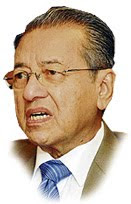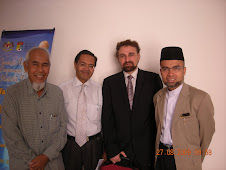Monday July 21, 2008
Making it a breeze to do business in Malaysia
By SOO EWE JIN
Pemudah upbeat about raising competitiveness of the country
AMID the political turmoil, the people behind Pemudah, the special taskforce to facilitate business, remain upbeat about raising the country's competitiveness through constant improvements in the public delivery system.
One and a half years after the panel was set up in February 2007, the 12 CEOs from the private sector and the country's 12 top civil servants continue to meet regularly and there is perfect attendance at practically every meeting.
The panel is co-chaired by Chief Secretary to the Government Tan Sri Mohd Sidek Hassan and Federation of Malaysian Manufacturers president Tan Sri Yong Poh Kon.
There may be a lot of discussion on the political and economic situation but that does not distract members from their primary task, which is to enhance the competitiveness of the country's economy.
The two chairmen of Pemudah, the Chief Secretary to the Government Tan Sri Mohd Sidek Hassan (left) and the Federation of Malaysian Manufacturers president Tan Sri Yong Poh Kon with Pemudah's first annual report that was distributed during a press conference on Feb.29. - The Starpic by Raja Faisal Hishan
Pemudah can look back at its string of achievements with pride as the impact is immediately felt on the ground (see box).
“I am especially proud of these successes because the emphasis is on speed. We have shortened the time required to do business in Malaysia,” said panel member Tan Sri G. Gnanalingam, who is the executive chairman of Westport.
“Now that things are moving faster, this means there will be less reason for bribes to be offered. With faster service and reduced corruption, Malaysia will be considered more competitive and that has always been one of our main priorities in Pemudah.”
However, Gnanalingam calls these achievements “low-lying fruits” or the ones that could easily be done.
“Now we will climb higher up the tree to pluck the fruits up there. This will be the true test for Pemudah.”
Without being specific, Gnanalingam said the upcoming budget should see more of Pemudah's new recommendations being implemented.
Pemudah's ability to get things done is due in no small part to the fact that Prime Minister Datuk Seri Abdullah Ahmad Badawi is himself a civil servant who understands the problems within the system and why it is vital to have an excellent delivery system.
Sidek, too, being a government officer who has risen to the highest rank of the civil service, knows what it means for the nation to be competitive and to be able to attract investors from around the world. His stint at the International Trade and Industry Ministry gave him the opportunity to know the changes needed.
Tan Sri G. Gnanalingam
According to Gnanalingam, being competitive is independent of whether “we are going through good times or bad times.”
“Many of the problems we face now are global in nature and we have to be prepared for the recovery times as well,” he said. He plays down the current political tension as being a “localised” issue, stressing that business is moving forward as usual.
Malaysia, he said, was very competitive in the 1980s and 1990s but slipped behind in recent years.
“We need to address the issues and improvements to the public delivery system are even more vital at times like these,” he added.
In the months ahead, Pemudah is expected to focus on procedures involved in starting a business, building a factory, registering a property, exporting/importing, paying taxes, employing foreign expertise, and the like.
More channel of e-payments will also be created for the settlement of assessment dues, traffic summonses, quit rent as well as JPJ transactions.
“Settling payment at any government agency is now a cinch,” said Gnanalingam.
“Corruption is often about delay and discretion. As long as we have clear-cut policies that are not subject to discretionary powers, and there is no time delay in the process, there is no corruption.
“Now we can get a passport in two hours. Why do you want to pay anybody to help you get a passport?”
Entrepreneur Alan Lim agrees. “From renewing my driving licence to my passport, I find everything so efficient these days. As I am now venturing into new business areas, even the procedures to get permits and licences have been very much improved and I do not have to get runners to help me,” he said.
“Time saved is good for business, especially in tough times like now.”
Although pleased with the progress so far, Gnanalingam stressed that the momentum must continue.
“We need to continuously raise the standards, benchmarking against the best. We have started to instil a culture of serving with integrity and zero tolerance to corruption. Response has been positive as members of the civil service are going the extra mile to effect the change,” he said.
Pemudah's approach to speed up some processes will invariably result in the delegation of power to more officers to remove bottlenecks.
Greater transparency in approval criteria and track and trace systems with greater use of IT contribute to checking the abuse of power and enhances accountability of civil servants.
“Pemudah has and will consider various options to speed up processes, including the use of multiple application forms, multiple licenses, extended licenses and greater use of IT.
These are indeed ways of reducing and/or consolidating processes to make them more efficient and less burdensome to the private sector,” said Gnanalingam.
Pemudah, meanwhile, is confident the country's rankings in World Bank's Doing Business Index & Report 2008 would improve this year, underpinned by its sustained momentum for change in the public delivery system.
Malaysia was ranked 24th during the April 2006 to June 2007 period and Pemudah members believe the next ranking will definitely be higher.
Beyond an improved ranking, what is clear is that there will be further initiatives to ease the time and costs of doing business, including further refining of tax matters, streamlining hotel licenses and instilling zero tolerance towards corrupt practices.
“Pemudah will focus not just on business facilitation but also on issues that affect the lives of the ordinary citizens,” said Gnanalingam.
For latest MSEB indices, charts and other information click here
Subscribe to:
Post Comments (Atom)







































No comments:
Post a Comment